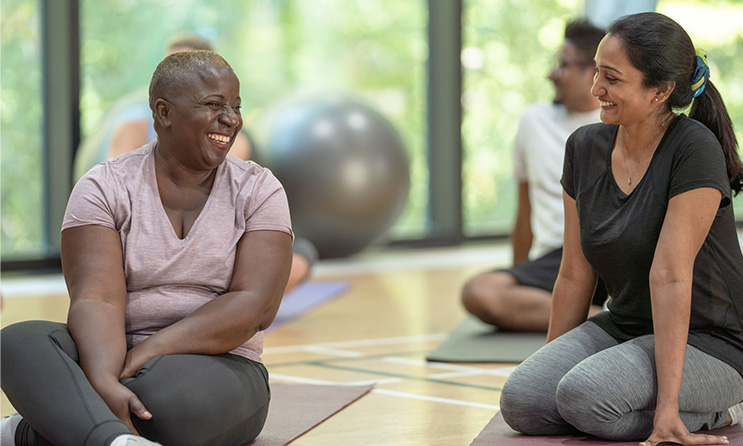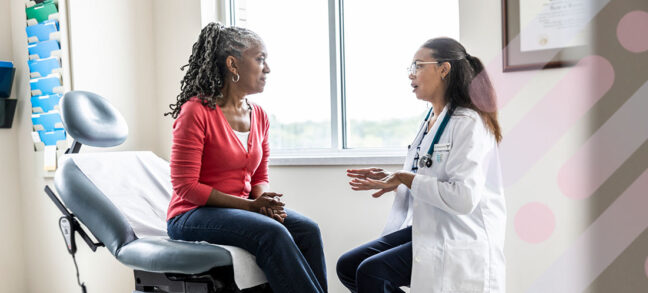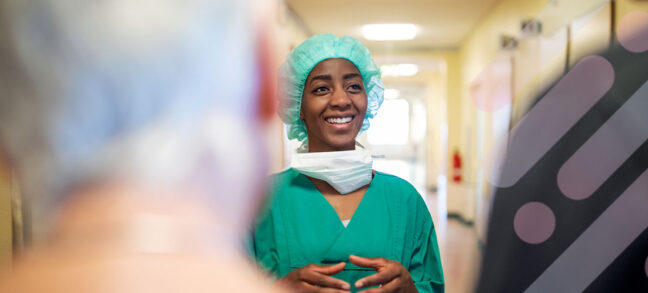If you’re undergoing or recovering from breast cancer treatment, exercise may be the last thing on your mind. But whether you loved or loathed hitting the gym before treatment, exercising can improve your current and future health, both physical and mental.
can I exercise during treatment?
First of all: Ask your doctor. Exercise during breast cancer treatment is generally safe, and even recommended. Your doctor can help you determine what type and level of exercise would benefit you most.
If you didn’t exercise before your diagnosis, it’s important to start slow and build up strength and endurance in order to avoid injury.
If you followed an exercise routine before your diagnosis, listen to your body. It may help you feel better, both physically and mentally, to stick to that routine to the extent that you are able. However, it’s okay to pay attention to your fatigue and take things easy—your body is working hard on your recovery. When in doubt, don’t overdo it.
After a mastectomy, check with your surgeon about exercise. In general, avoid overhead lifting and strenuous exercise for 4–6 weeks after reconstruction.
When you exercise, keep these precautions in mind:
- If you’re going through chemotherapy or radiation, your immune system may be weakened. You may want to avoid public gyms and swimming pools where illness can spread easily.
- If you have neuropathy (numbness or pain in your hands and feet), exercise with a buddy to avoid falling or hurting yourself.
- If your chemotherapy is treating cancer that has spread to the bone, you may have to lower the intensity of your workout, since your risk of breaking a bone is higher.
- In general, check with your doctor about how your specific treatment regimen may affect your ability to exercise.
 benefits of exercise during treatment and recovery
benefits of exercise during treatment and recovery
Exercising during and after treatment may help improve a variety of treatment-related side effects, including fatigue. In some studies, exercise has also been associated with better survival rates for certain cancers, including breast cancer.
If you’re a breast cancer survivor, exercise may help reduce long-term side effects of cancer treatment, including fatigue, cardiovascular issues, osteoporosis, peripheral neuropathy, lymphedema and more.
Research suggests that yoga can improve quality of life, as well as reduce fatigue and sleep problems, in cancer patients. Other types of exercise shown to improve quality of life for breast cancer patients and survivors include water exercises, Pilates, strength training and aerobic exercise (also known as cardio, which includes walking, swimming, running and cycling). In short: You can benefit from any type of exercise that you enjoy and that your doctor says is safe for you.
how do I start?
How about going for a walk? If you’re new to exercise or are recovering your stamina and strength, walking is a low-impact option to improve your cardiovascular fitness. Try incorporating a walk around the block into your daily routine.
Consider finding a personal trainer with experience working with breast cancer patients. A certified personal trainer can work with you one-on-one to develop a safe and effective exercise routine.
Your local YMCA may have a LIVESTRONG program. These programs, designed specifically for cancer patients and survivors, can be tailored to your treatment journey while connecting you to others undergoing cancer treatment.
In general, a thorough exercise plan should include breathing exercises, stretching, balance exercise, cardio and strength training to the extent you are able. Your body will reap the benefits throughout your recovery, and maybe you’ll even discover a new lifelong fitness activity that you enjoy.
Some links will navigate you away from the Resensation® website. Links outside of resensation.com are provided as a resource to the viewer, and do not constitute an endorsement or recommendation by Axogen. Axogen accepts no responsibility for or control over the content of the linked sites.
Resensation Articles

How does mastectomy impact the nerves in the breast?
One sometimes overlooked aspect of mastectomy is its impact on nerves. Read what happens to nerves during mastectomy and explore…
Read More
What happens during implant breast reconstruction with Resensation®?
By repairing sensory nerves, Resensation® enables you to potentially regain sensation to your chest. Read how this procedure works during…
Read More
how resensation® helped Leanna feel secure in her family’s future
With Resensation®, Leanna can be there to watch her kids grow up—without losing the feeling of being whole.
Read More
post-surgery sensory retraining: instructions and video guide
Sensory retraining is a series of exercises designed to help you reconnect with your body after breast reconstruction with Resensation®.
Read More